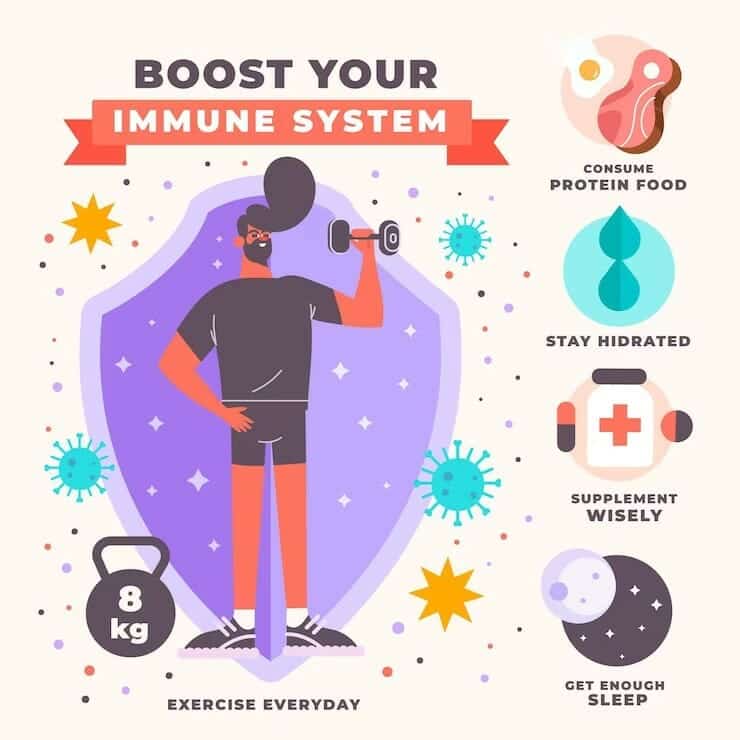Maintaining a healthy lifestyle can be challenging in today’s modern times, where convenience is king. Our decisions regarding our food and lifestyle habits can often disrupt health. An unhealthy lifestyle and food habits usually results in a compromised immune system.
Our body’s immune mechanism is one of the most critical systems. It protects the body from the onslaught of various pathogens and toxins. It is a complex network of cells, tissues, and organs that work together to keep our body healthy and strong.

Low Immunity
Table of Contents
Importance of a Strong Immune System
- A robust immune system lowers the risk of contracting illness, infections and diseases.
- It also enables the body to recover at a quicker rate.
- A weakened immune system can also pave the way for autoimmune diseases like Rheumatoid Arthritis, T1 Diabetes, Hashimoto’s etc.
Factors Affecting the Immune System
Our immune system, which plays a critical role in protecting us from illness and disease, can suffer significantly from the effects of wrong food habits and lifestyle. Five main elements can topple a solid immune system. These are:
- Excessive Sugar
- Refined and Ultra Processed foods
- Chronic Stress
- Poor sleep quality
- Toxins
These factors can compromise our immune system, making us more vulnerable to infections and illnesses. Therefore, it is essential to understand the impact of these factors on our immune system and explore natural alternatives and antidotes to boost immunity.
Excessive sugar consumption has become a prevalent issue in our society, with sugary beverages and processed foods easily accessible. The adverse effects of sugar on our immune system are numerous, including inflammation, oxidative stress, and impaired immune cell function. Moreover, chronic stress and poor sleep patterns can further weaken our immune system, making us more susceptible to infections.
Therefore, we must evaluate our lifestyle choices and consciously improve our immune function by ditching sugar, managing stress, and sleeping better. This article will delve deeper into the factors affecting our immune system and provide practical tips to help boost immunity naturally.
Effects of Excessive Sugar
Excessive sugar consumption is linked to weakened immune responses and increased susceptibility to infections such as colds and flu. This is because high sugar intake can increase inflammation, negatively impacting the immune system’s ability to fight off infections. High sugar intake can also impair the function of white blood cells, which are essential for the immune response.
Therefore, to improve immune function, it is essential to reduce sugar intake of all types. It is useful to note that sugar doesn’t mean refined white sugar alone. Sugar is disguised under many names and often hidden under fine print and chemical terms. There are nearly 90+ sugar equivalents – each having its own harmful effects in the long run.
Alternate means of sugars in the form of dates, fruits, etc. can be consumed in small quantities. While, in small amounts, these may not negatively impact metabolically fit people, they do have the same effect as sugar on people whose metabolism is compromised – i.e., people with Type 2 Diabetes and high Insulin Resistance.
High Sugar Intake:
- Weakens immune response
- Increases susceptibility to infections
- Impairs the function of white blood cells
Low Sugar Intake
- Improves immune function
- Reduces risk of infections

hidden names of sugar
Refined and Ultra Processed Food
Most processed foods contain several additives, preservatives, artificial thickeners and emulsifiers. While these are added to increase the shelf life of the food product, they can severely impair our gut system in the following manner:
- Harming the gut bacteria,
- Allowing gut permeability,
- Impairing the gut lining,
- Cause inflammation, etc.
Ultra Processed and Refined food
These actions in turn reduce the strength of our immunity. Almost all foods under this category also contain large quantities of Omega 6 fatty acids (O6 FA). Our body requires only a small amount of O6 FA and larger amounts of Omega 3 Fatty Acids. When there is an imbalance in these 2 types of fats, leading to large quantities of O6, it leads to chronic inflammation that in turn weakens the immune system.
Improper Sleep Patterns
To optimize immune function, one must pay attention to the quality and duration of rest, as well as implement effective stress management techniques. Sleep is crucial for the body to repair and regenerate, and a lack of sleep can lead to a compromised immune system.
Poor sleep could result from an unhealthy lifestyle, excessive gadget exposure, late-night snacking, poor metabolic health, stress, etc. These patterns lead to elevated cortisol and reduced melatonin levels.
It is recommended to create a relaxed and quiet environment for sleeping and to ensure that nutrient supports like Omega-3s are being consumed. Low levels of Omega-3s have been linked to worse sleep patterns, so increasing intake may be beneficial.
Additionally, non-exposure to gadgets for at least 1 hour before sleep tends to improve sleep quality.
Incorporating relaxation techniques like mindful breathing or meditation before bed can help reduce stress and promote more restful sleep.
Chronic Stress
Effective stress management is also essential for immune function. Chronic stressors can increase cortisol levels, a hormone that can suppress the immune system. Stress can also have an indirect effect on the immune system as a person may use unhealthy behavioural coping strategies to reduce their stress, such as drinking and smoking.
Mindfulness practices like yoga, meditation, or even mindful eating can help reduce stress levels and improve immune function. Walking in nature or listening to music are other ways to reduce stress and promote relaxation.
It is essential to find the stress management techniques that work best for each individual, as different methods may have varying effects. By prioritizing adequate sleep and effective stress management, the immune system can be strengthened and better equipped to fight off illness.
Toxins
Another component that harms the immune system is Environmental Toxins. Toxins are found everywhere – herbicides, pesticides, hormones, antibiotics, mold, fungi, pollution, etc. They are also found in many of our household and cosmetic items like – nonstick coating, plastics, aluminium, deodorants, cleaning agents, food packaging material, hairsprays, lotions, etc.
These toxins can cause several health problems like – respiratory tract infections and diseases, skin allergies, kidney problems and certain types of cancers.
Learning about these toxins and their impact, minimizing products with such chemicals, maintaining a clean, hygienic environment, and choosing a healthy lifestyle are some of the ways in which we can reduce toxic build-up and maintain a healthy immune system.
Frequently Asked Questions
What are some natural ways to boost immune function?
Incorporating a healthy lifestyle and select herbal remedies can boost immune function. Examples include exercise, adequate sleep, and consuming immune-boosting herbs such as garlic, turmeric, bone broth, elderberry, and garlic.
Fasting is also a great way to boost immunity. Fasting induces autophagy where the body recycles old cells and flushes out toxins. Read more about fasting in this article : Intermittent Fasting 101
Can chronic stressors have a long-term impact on immunity?
Chronic stressors can have long-term impacts on immunity, compromising immune function and increasing susceptibility to illness. Coping with chronic stressors through mindfulness, nature walks, yoga, music, meditation, dance, and mindful eating may improve immune function.
How does exercise affect immune function?
Exercise benefits immune response by increasing the circulation of immune cells and antibodies, reducing inflammation, and improving gut microbiota. Regular physical activity may decrease the risk of infections and chronic diseases while enhancing overall immune function.
Are there any specific foods that can improve sleep patterns?
Mushrooms, almonds, fatty fish and tart cherries are some of the foods that can improve sleep patterns. They contain natural melatonin alternatives that regulate sleep-wake cycles. Incorporating these foods into one’s diet can promote better sleep and overall health.
How does a lack of sleep affect the immune system beyond just increasing susceptibility to illness?
Sleep deprivation consequences on the immune system include impaired immune function, decreased immune response to vaccines, and increased inflammation. Adequate sleep is crucial for immune system recovery and overall health.

Boost Immune System
It is important to note that a healthy immune system requires a balanced and varied diet and appropriate levels of physical activity. A diet rich in whole foods, such as fruits, vegetables, small quantities of whole grains, healthy fats and high-quality protein-rich foods can provide the necessary nutrients to support immune function. Furthermore, regular exercise not only reduces stress and improves sleep patterns, but also enhances immune response.
Individuals can take proactive steps to support their immune system and reduce their risk of illness by prioritising healthy food choices and exercise routines.
